 Petzlover
Petzlover Kanni is originated from India but Tea Cup Chihuahua is originated from Mexico. Kanni may grow 29 cm / 12 inches higher than Tea Cup Chihuahua. Kanni may weigh 19 kg / 42 pounds more than Tea Cup Chihuahua. Both Kanni and Tea Cup Chihuahua has almost same life span. Kanni may have more litter size than Tea Cup Chihuahua. Kanni requires Low Maintenance. But Tea Cup Chihuahua requires Moderate Maintenance
Kanni is originated from India but Tea Cup Chihuahua is originated from Mexico. Kanni may grow 29 cm / 12 inches higher than Tea Cup Chihuahua. Kanni may weigh 19 kg / 42 pounds more than Tea Cup Chihuahua. Both Kanni and Tea Cup Chihuahua has almost same life span. Kanni may have more litter size than Tea Cup Chihuahua. Kanni requires Low Maintenance. But Tea Cup Chihuahua requires Moderate Maintenance
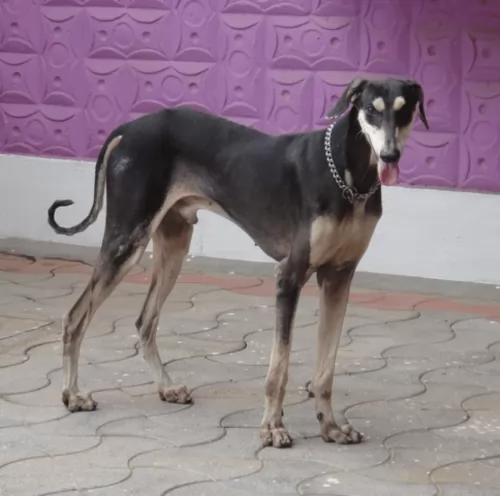 The Kanni dog is a rare South Indian Sighthound. It is also known as the Maiden's Beastmaster and this is because it is known to be protector and defender of its owner's property.
The Kanni dog is a rare South Indian Sighthound. It is also known as the Maiden's Beastmaster and this is because it is known to be protector and defender of its owner's property.
During ancient times, the dog was used for hunting but today it is essentially kept as a pet and it is registered with the Kennel Club of India.
 Chihuahua is a state in the country of Mexico. From this state, the dog breed Chihuahua and the “teacup, or toy” chihuahua take their name. Interestingly the Chihuahua Club of America maintains that “teacup” Chihuahuas do not exist and that the size differential is normal for the breed. Chihuahuas or their ancestors have been around a very long time, sadly the exact origins of the Chihuahua are lost into the pages of history, but archaeological clues such as wheeled dog toys, art, and pottery link the Chihuahua to Mexico and to the Techichi dog. The Techichi dog at the time of the Spanish Conquistadors was sold for food (not unlike we sell beef or chicken) and also as a companion dog to death. Cortez even mentioned the Techichi dog in a letter sent back to Spain, describing them as being raised for food and sold in the marketplace.
Chihuahua is a state in the country of Mexico. From this state, the dog breed Chihuahua and the “teacup, or toy” chihuahua take their name. Interestingly the Chihuahua Club of America maintains that “teacup” Chihuahuas do not exist and that the size differential is normal for the breed. Chihuahuas or their ancestors have been around a very long time, sadly the exact origins of the Chihuahua are lost into the pages of history, but archaeological clues such as wheeled dog toys, art, and pottery link the Chihuahua to Mexico and to the Techichi dog. The Techichi dog at the time of the Spanish Conquistadors was sold for food (not unlike we sell beef or chicken) and also as a companion dog to death. Cortez even mentioned the Techichi dog in a letter sent back to Spain, describing them as being raised for food and sold in the marketplace.
When a death occurred a dog was chosen as a companion and cremated with the deceased. It was believed that the dog helped the soul of the decedent reach their eternal destination. The Techichi dog from which the modern-day chihuahua likely descended was very plentiful in the central American area that is now the country of Mexico and raised by the ancient Toltecs and later the Aztec people.
Chihuahuas are little dogs and come in a variety of coats, head shapes and even (within the designation small) sizes. The designation “teacup, toy or pocket” while not an official breed name is a useful descriptor, since they are the littlest of an already small breed and these minute pets, as puppies, may fit into a teacup or a pocket.
Fortunately while no longer a food source, the chihuahua is now sought after as a loyal and lively pet and companion.
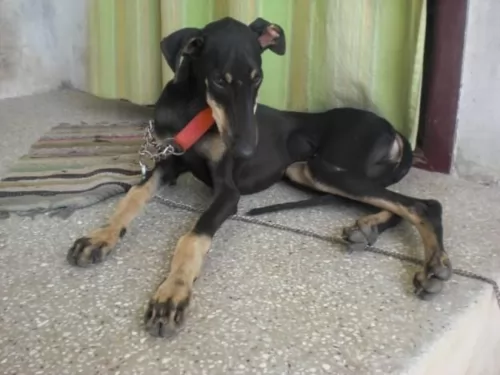 These dogs are tall, slim and deep chested, coming in two-color combinations, but it is the black and tan variety that is the true Kanni. There is also a cream variety. There are other color variations and each color has a unique name connected to it. The coat of the Kanni is short and smooth.
These dogs are tall, slim and deep chested, coming in two-color combinations, but it is the black and tan variety that is the true Kanni. There is also a cream variety. There are other color variations and each color has a unique name connected to it. The coat of the Kanni is short and smooth.
They are medium sized dogs standing at 62 to 67cm at the withers and weighing in the region of 18 – 22kg. When you first look at these dogs you might think of them as being similar to a Greyhound in looks. This is also because of their lean, muscular looks.
The eyes are a golden color, the nose black and the ears are a medium size and floppy with the long tail being semi-curved.
The Kanni has always been a hunting dog so he is used to being sharp, strong-willed, independent and alert as well as having some aggressive tendencies. It is also quite a reserved dog but he shows love and loyalty to his owner. He is independent and easy to train. It is a good thing to have him trained and socialized so that he is obedient to the simple commands you give him.
 Chihuahuas are small. Even the bigger ones are only about six pounds and a “teacup” or “toy” is often three pounds or less. Their bodies are slightly longer than they are tall, but even the tallest are not over nine inches. Chihuahua standing under five inches in height is not uncommon in the “teacup” or smallest of these dogs. They have two different head types and a domed skull. One type of head shape is like a deer while the other is described as an apple-shaped head. The apple-shaped heads are more popular than the deer shaped heads, although sometimes in the “teacup” especially the soft spot fails to close at maturity when growth is complete and the bones should knit, therefore leaving a soft spot in their skull – this is called a molera.
Chihuahuas are small. Even the bigger ones are only about six pounds and a “teacup” or “toy” is often three pounds or less. Their bodies are slightly longer than they are tall, but even the tallest are not over nine inches. Chihuahua standing under five inches in height is not uncommon in the “teacup” or smallest of these dogs. They have two different head types and a domed skull. One type of head shape is like a deer while the other is described as an apple-shaped head. The apple-shaped heads are more popular than the deer shaped heads, although sometimes in the “teacup” especially the soft spot fails to close at maturity when growth is complete and the bones should knit, therefore leaving a soft spot in their skull – this is called a molera.
Like different shaped heads chihuahua may have long hair or short-haired coats. The short-haired coats are smooth. The Chihuahua coats may be a large variety of colors ranging from black to white, with red, brown, fawn, cream and chocolate and they may be solid-colored, spotted or sabled. Personal preference is the determining factor on the type of coat a pet Chihuahua has since the breed does not have a preferred color, pattern, hair length or feel. Their muzzle (nose/mouth combination) is short and pointed. Chihuahua have have naturally erect pointed ears and large round eyes. A Chihuahuas tail is relatively long and mostly either curled up and over the back or carried up.
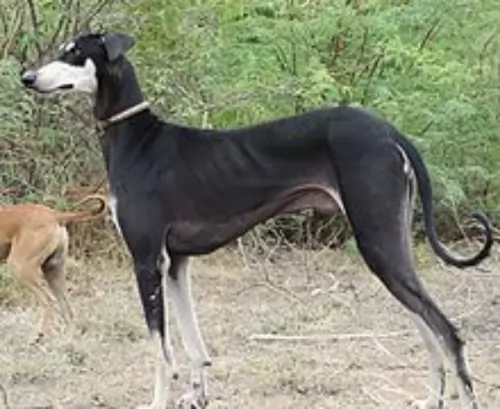 The Kanni looks much like your regular Doberman Pinscher but he has long tail and floppy ears. He is slim and agile but also powerful being able to have bursts of speed. It is why he requires a large place to run and play in, being better suited to a home with a large garden or farm.
The Kanni looks much like your regular Doberman Pinscher but he has long tail and floppy ears. He is slim and agile but also powerful being able to have bursts of speed. It is why he requires a large place to run and play in, being better suited to a home with a large garden or farm.
He is a playful, quiet dog but he has quite a bark on him and is known to be a good watchdog because of this. He is a protective dog too, devoted and loyal and making a splendid family pet.
 Children friendliness very interactive with family but has been known to nip at small children and bark, so no not really
Children friendliness very interactive with family but has been known to nip at small children and bark, so no not really
3. Adaptability yes but they are better off in apartments and homes not out in the country where their size makes them targets for predators.
4. Learning ability average ability to learn but Chihuahua can be but stubborn which may impact ability and willingness to learn.
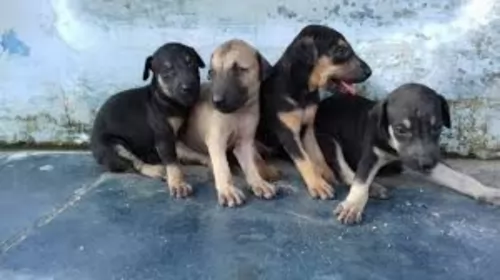 Not much is known about inherited health problems in this breed, and he can live up to a ripe old age of 16. It seems a pretty healthy dog, but still it helps to be aware of some of the more common dog illnesses that your pet can succumb to.
Not much is known about inherited health problems in this breed, and he can live up to a ripe old age of 16. It seems a pretty healthy dog, but still it helps to be aware of some of the more common dog illnesses that your pet can succumb to.
For first time dog owners it can be difficult knowing what health problems our beloved pets could suffer from. Every dog breed has certain diseases to which they are more prone to, but these are some common issues that most of our 4-legged friends will face -
This is a common dog health problem in India with the Kanni. There are so many things that disagree with their digestion. Most dogs may not want to eat their next meal, but when he is lethargic, he is hot and is vomiting, it is time to get your pet to the vet. This is because diarrhea causes rapid dehydration in dogs. To avoid diarrhea, steer clear of certain foods such as milk and dairy products as well as old, spoiled fatty foods. With diarrhea your dog must always have access to fresh, cool water.
This is a common dog disease, and ear infections can be painful and frustrating for your pet. He’ll scratch at his ear, shake his head and the inside of the ear may be red with a discharge. Check his ears for redness and try to keep them free from wax build up and dust.
Cleaning the ear is quite simple, and if you’re not sure how, the vet can do it quickly and effectively. Usually some dog ear cleaning solution on some cotton wool can do the trick. Ear infections are common in dogs like the Kanni with floppy ears.
It is essential to control fleas on your dog from word go. Fleas thrive in warm temperature and humidity and your pet will scratch, bite and lick at the spot. When you brush your pet, look through his fur for fleas and tell you vet about it if you discover ticks and fleas. A topical ointment could nip the problem in the bud. You may want to consider a flea collar for your pet.
Tapeworms, hookworms and roundworms for instance are commonly found in dogs, and even for healthy dogs, deworming tablets should be given from time to time. If your dog has worms, you’ll notice lethargy, loss of appetite, diarrhea and vomiting. It may be time to get your pet to the vet.
 Chihuahuas live on average fourteen to eighteen years. There are some issues that may cause concern or lower life expectancy.]
Chihuahuas live on average fourteen to eighteen years. There are some issues that may cause concern or lower life expectancy.]
• Hypoglycemia (low blood sugar) is something to watch for. Low blood sugar can cause death in just a few hours but when caught is very easily treated. Some of the symptoms are being uncoordinated when walking, acting sleepy or lethargic, unfocused sight, fainting, having a seizure or having spasms in the muscles of the neck. First aid can right this condition with a sweet supplement like corn syrup, or honey. This is more common in puppies, but the teacup chihuahuas are susceptible.
• Hydrocephalus (water on the brain) can affect many toy dog breeds. The puppy or dog will appear to have an oversized head, and be slow (display lethargy) and grow slower than its littermates.
• Pulmonic stenosis (a heart condition) occurs when the right ventricle is impeded. Teacup Chihuahuas are also susceptible to heart murmurs.
• Collapsed trachea this occurs when the cartilaginous rings in a Chihuahua do not form completely or weaken. This can be hereditary or an acquired condition and occurs in other small breeds of dog.
• Molera – where after finishing growth a soft spot remains in the skull and the bones do not knit. As a puppy, the owner must remain vigilant about head injuries.
• Obesity (overweight). Most of the time this is a result of the Teacup Chihuahua being overfed. Obesity can contribute to a shortened lifespan and chronic bronchitis.
• Cold susceptibility. Cold weather can cause Teacup Chihuahuas to shiver or tremble when exposed and during cold temperatures, the dogs may need to wear a sweater and boots outside and cuddle with their owners under blankets or bask in the sun to stay warm.
• Infected or injured eyes. Due to the prominent eyes, exposure to irritants such as dust, allergens, or dry air can cause the dog to develop this beginning with watering eyes.
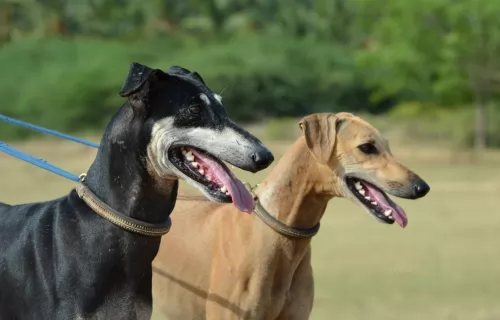 The Kanni is a low maintenance dog with his short coat. You can give him a good brush twice a week, check that his nails don't grow too long and also check his ears inside and out. Ticks and fleas are rife in hot weather and you want to give your dog a thorough check for these. You should also be checking your dog's teeth and brushing them 2 or 3 times a week. Dental problems can cause havoc with your dog's health.
The Kanni is a low maintenance dog with his short coat. You can give him a good brush twice a week, check that his nails don't grow too long and also check his ears inside and out. Ticks and fleas are rife in hot weather and you want to give your dog a thorough check for these. You should also be checking your dog's teeth and brushing them 2 or 3 times a week. Dental problems can cause havoc with your dog's health.
As a hunting breed, the Kanni is used to running so his needs for a good amount of exercise are quite high. While they do make good family pets, they hanker after wide open spaces and being busy. If you own one of these dogs, make sure that you exercise him often because otherwise he becomes frustrated and unhappy.
This dog has always been used to village life where he is free to roam wide open spaces. He is much more suited to country life than to city life, and as a pet, you will need to ensure that he receives a good amount of exercise.
Take him for walks, and if he's been socialized and trained, take him to the park and allow him off his leash to run.
The dog has always been fed traditional food such as porridge and milk but we know better now that dogs need protein too as well as a diet rich in vitamins and minerals to ensure his health.
You can feed him a top quality commercially manufactured dog food and add in some cooked chicken, rice and vegetables from time to time. It is expensive, but if you can, try and add in some raw meat occasionally as well. Your Kanni dog must always have access to fresh, clean water.
 1. Feeding the Puppies. Puppies should be fed four times a day. Underfeeding can cause the issues of low blood sugar and overfeeding can result in obesity increasing the risk of other health complications.
1. Feeding the Puppies. Puppies should be fed four times a day. Underfeeding can cause the issues of low blood sugar and overfeeding can result in obesity increasing the risk of other health complications.
2. Feeding the Adult. Adult teacups are also vulnerable to hypoglycemia and obesity. Of course, the low blood sugar will be much more acute than obesity and need prompt care if it occurs. Adult teacups should be fed twice a day.
3. Points for Good Health. The chihuahua generally exhibits more vigor and endurance than pet owners expect from such a small breed of dog.
4. Games and Exercise for Teacup Chihuahua. Go ahead and run and play but remember even with the unexpected stamina and endurance this is a very small dog, small legs, using discernment, judgment, and restraint so the games and exercise is fun and builds health and is a special bonding time, without jeopardizing the sugar levels or causing exhaustion or misery.